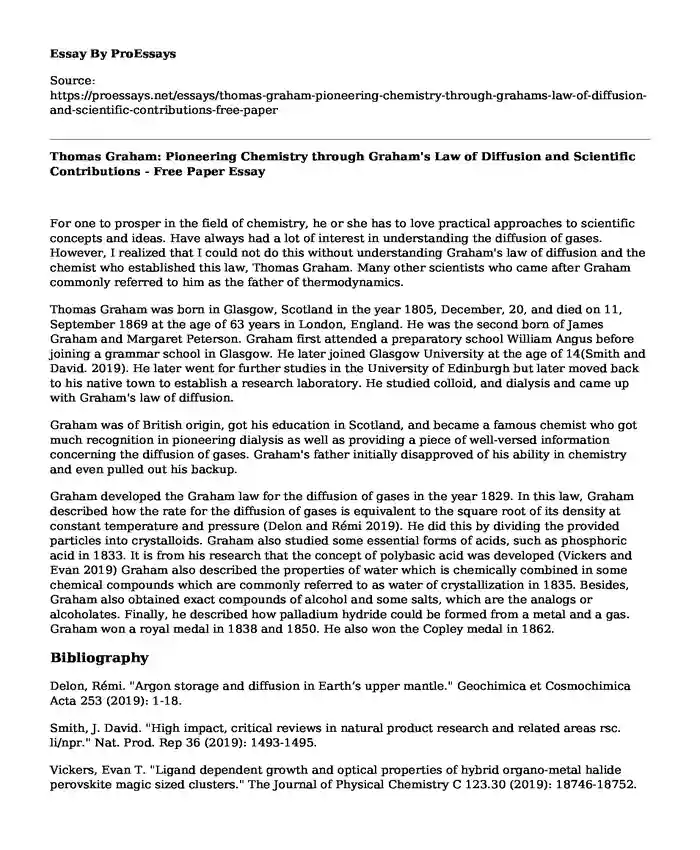For one to prosper in the field of chemistry, he or she has to love practical approaches to scientific concepts and ideas. Have always had a lot of interest in understanding the diffusion of gases. However, I realized that I could not do this without understanding Graham's law of diffusion and the chemist who established this law, Thomas Graham. Many other scientists who came after Graham commonly referred to him as the father of thermodynamics.
Thomas Graham was born in Glasgow, Scotland in the year 1805, December, 20, and died on 11, September 1869 at the age of 63 years in London, England. He was the second born of James Graham and Margaret Peterson. Graham first attended a preparatory school William Angus before joining a grammar school in Glasgow. He later joined Glasgow University at the age of 14(Smith and David. 2019). He later went for further studies in the University of Edinburgh but later moved back to his native town to establish a research laboratory. He studied colloid, and dialysis and came up with Graham's law of diffusion.
Graham was of British origin, got his education in Scotland, and became a famous chemist who got much recognition in pioneering dialysis as well as providing a piece of well-versed information concerning the diffusion of gases. Graham's father initially disapproved of his ability in chemistry and even pulled out his backup.
Graham developed the Graham law for the diffusion of gases in the year 1829. In this law, Graham described how the rate for the diffusion of gases is equivalent to the square root of its density at constant temperature and pressure (Delon and Rémi 2019). He did this by dividing the provided particles into crystalloids. Graham also studied some essential forms of acids, such as phosphoric acid in 1833. It is from his research that the concept of polybasic acid was developed (Vickers and Evan 2019) Graham also described the properties of water which is chemically combined in some chemical compounds which are commonly referred to as water of crystallization in 1835. Besides, Graham also obtained exact compounds of alcohol and some salts, which are the analogs or alcoholates. Finally, he described how palladium hydride could be formed from a metal and a gas. Graham won a royal medal in 1838 and 1850. He also won the Copley medal in 1862.
Bibliography
Delon, Rémi. "Argon storage and diffusion in Earth’s upper mantle." Geochimica et Cosmochimica Acta 253 (2019): 1-18.
Smith, J. David. "High impact, critical reviews in natural product research and related areas rsc. li/npr." Nat. Prod. Rep 36 (2019): 1493-1495.
Vickers, Evan T. "Ligand dependent growth and optical properties of hybrid organo-metal halide perovskite magic sized clusters." The Journal of Physical Chemistry C 123.30 (2019): 18746-18752.
Cite this page
Thomas Graham: Pioneering Chemistry through Graham's Law of Diffusion and Scientific Contributions - Free Paper. (2023, Dec 13). Retrieved from https://proessays.net/essays/thomas-graham-pioneering-chemistry-through-grahams-law-of-diffusion-and-scientific-contributions-free-paper
If you are the original author of this essay and no longer wish to have it published on the ProEssays website, please click below to request its removal:
- Paper Example on the Lunar Effect
- Research Paper on Civil War Reconstruction
- The Development of American Economy Essay
- Haiti Revolution: Slaves' Rebellion & Global Impact - Essay Sample
- Essay Sample on Real-Life Uses of Algebra: Shopping, Cooking & More
- Paper Example on Native American Cultural Heritage: Exploring Its History and Spirituality
- Essay Example on Frederick Douglass: Impact on US History Amidst Major Events







